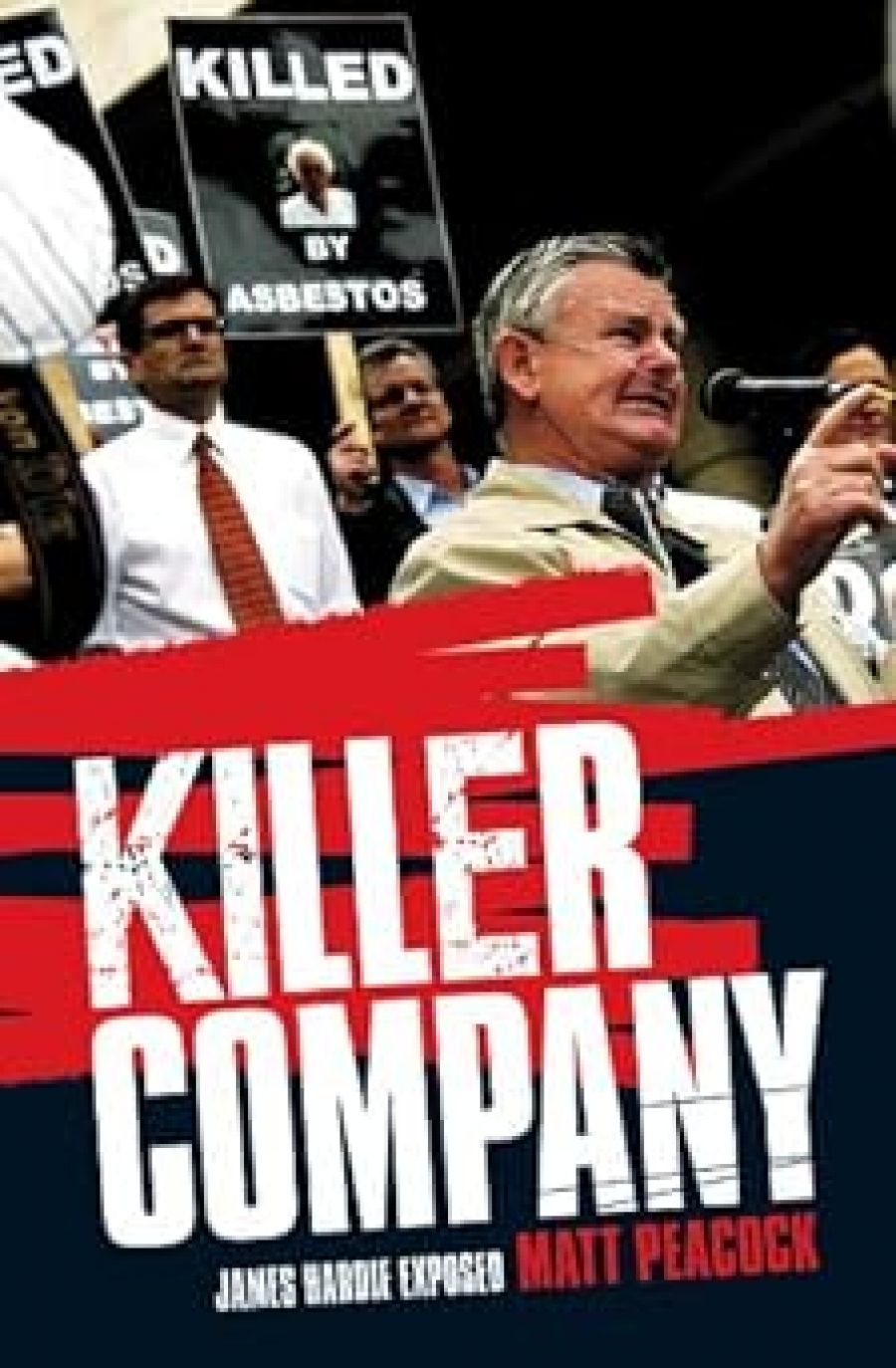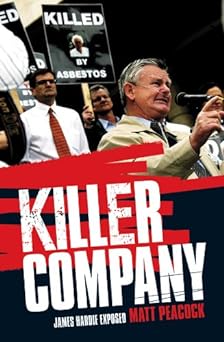
- Free Article: No
- Contents Category: Business
- Review Article: Yes
- Article Title: A hard country
- Online Only: No
- Custom Highlight Text:
Big business is a hard country. Matt Peacock tells the story of the James Hardie company and its venality as the manufacturer of fibro cement products in Australia. The fibro shack has been as iconic a domestic symbol as the Hills hoist, and Australia used more fibro per head than any other developed nation. However, the fibre in fibro for much of the twentieth century was asbestos, exposure to which is lethal.
- Book 1 Title: Killer Company
- Book 1 Subtitle: James Hardie exposed
- Book 1 Biblio: ABC Books, $35 pb, 330 pp
- Book 1 Cover Small (400 x 600):

A key revelation in the book is the extent of exposure to asbestos beyond production and immediate use. The home handyman was at risk, as were children who played in waste dumps or helped their parents to lay driveways made of asbestos waste. Banana growers used discarded bags that held asbestos to shield their crops from the sun. Thousands of homes have carpet underfelt which was manufactured from these same discarded bags. Peacock estimates that a further 20,000 Australians will die from asbestos-related diseases.
Peacock, who has reported for the ABC since 1977 on James Hardie’s cover-up and its subsequent exposure, writes with verve and authority. James Hardie thrived for so long because of misplaced trust, the typical ‘she’ll be right’ attitude of Australians, but mostly because of the company’s deceptiveness. Hardie spent vast sums on public relations advisers and removed the word ‘asbestos’ from all publicity; Asbestos House, its head office in Sydney, was renamed; the company sponsored the ‘Life be in it’ program. John Reid, who took over as chairman from a father who espoused the virtue of ‘stewardship’, sought to project his own public image as a ‘Medici-like philanthropist’ and patron of carefully chosen causes. ‘It was many years later that the [James Hardie] executive realised such “stewardship” was focused on profit for the family and shareholders rather than the welfare of Hardie’s customers or employees.’
In 2000 James Hardie established a foundation to compensate current and future sufferers of asbestos-related disease. From the beginning, it was underfunded. Management seemed to hide such unconscionable actions under the guise of good business practice – the overriding interest of shareholders. Certainly, the directors who set up the foundation seemed to feel that asbestos was part of the company’s history. James Hardie had been reincarnated; asbestos was nothing to do with them.
Peacock’s story demonstrates the value of public transparency. Directors of the foundation disclosed its lack of resources, and the New South Wales government established a Special Commission to investigate. Its findings gave some comfort to James Hardie in its quest to cap payments, and preferably to set up a statutory scheme that would let it leave asbestos behind. However, the ACTU, through its then secretary, Greg Combet, and Bernie Banton, a sufferer from mesothelioma, agitated so successfully that the threat to James Hardie share price forced it to agree to full funding for the foundation.
Bernie Banton is the clear hero of the story. Typically, mesothelioma takes forty years to announce itself, with its victims dying after agonising decline within six months. Banton, in his early sixties, was shameless in his demands of lawyers and politicians. He comprehensively outfoxed the James Hardie spinners and, with days to live, secured a judgement that awarded both exemplary and punitive damages in his favour. James Hardie directors were found guilty of inadequate and misleading disclosures to the Australian Stock Exchange over funding for the compensation fund. In August 2009 they were fined and forbidden to hold directorships for a period. Their convictions are still under appeal.
Would other firms faced with similar challenges have acted differently? The answer is, probably not. The James Hardie directors and advisers were, and remain, part of the same culture that runs Australian industry. They were not a bunch of egregious deviants. Furthermore, the Hardie counterparts overseas acted no less dishonourably.
How James Hardie avoided its responsibilities for so long should be a case study for business ethics classes. Yet the story is complex because James Hardie has also become successful in ways we can admire. This success lies in the transformation of its products to using cellulose or wood fibre instead of asbestos fibre, and in its setting up of a US business which now accounts for eighty per cent of global sales. It is in these two latter achievements – innovation and international expansion – that Australian firms so routinely fail.
James Hardie has survived the recession, is financing the compensation fund, and its future looks positive. What does all this tell us? Big business is a hard country. It can do bad things for profit unless it knows that it will be forcibly called to account.


Comments powered by CComment